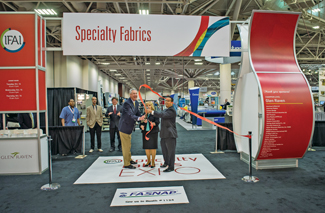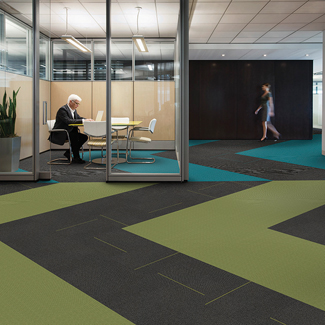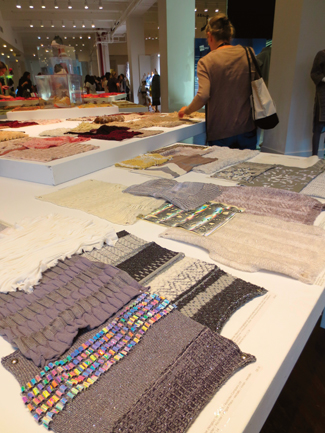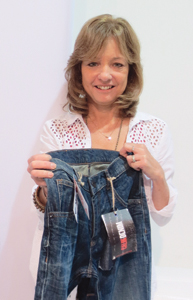HALIFAX, United Kingdom — December 2, 2014 — James Heal has substantially increased the tension and compression capacities of its latest model of its Universal Strength Tester – the Titan now provides the capacity to accommodate tests up to 5,000 Newtons (5kN).
The extensive range of tool-free specimen grips available for the Titan, for many different standards, test methods and materials types, has been further augmented by the introduction of five new tools, including tools and grips to test Elastane, Rivets, Studs, Press studs (also known as snap fastener and poppers), Velcro and leather products.
This increase in capacity, in conjunction with the existing and new enhanced range of tooling, offers laboratories the potential to significantly increase the number and scope of tests they can offer. With the new Titan Labs will be able to comply with more Standards, perform a wider array of tests on a wider range of product types, which could give them the opportunity to open up new markets, creating greater opportunities for increased business and to also improve efficiencies of their operators and instrument.
An Increase In Applications
The applications for the Titan are numerous. Product types which can be tested on this instrument includes woven and knitted fabrics, leather, coated fabric and nonwovens, in various forms such as yarn, fabric, garments, attachments to garments and attachments to children’s toys.
The diversity of tests which can be performed includes Seam Slippage and Seam Strength, Stretch and Recovery, Security of attachments, Compression Testing including Ball Burst, Puncture and Crush Resistance, Yarn strength, including Single Strand and Skein/Hank Strength, Tear Strength and Delamination, Tensile Strength and Elongation, the Baumann tear strength, hank (lea) strength and tests for buttons and zippers.
New tooling for the Titan enables specific testing of Studs and Buttons and for additional tests for Yarn. Additional tooling also includes a grip, the OctoGrip, which is complementary to the T12 grip. This tool has 8 claws to enable very small items, which would otherwise be extremely difficult to hold with the T12 jaws, to be held securely for testing. Further new tooling enables the Coefficient of Friction (COF) to be measured. This is used to ascertain the ratio of the force of friction between two surfaces and the force acting between them and has applications for packaging material and for products such as cork flooring and other sheet materials.
Automated Processes Increase Efficiencies And Improve Accuracy
One of the many beneficial aspects of using Titan is the simplicity of operation. This is further enhanced and supported by the easy to use and intuitive test analysis software known as TestWise™.
TestWise has many features to make the testing process easier for the operator but also significantly increases efficiencies and accuracy of the testing process. For example, TestWise incorporates an ever expanding library of pre-loaded standard and test methods which can easily be located through the ‘Filter’ option. Additionally, Standards which are used regularly within the laboratory can be saved within ‘Favourites’ for instant access.
Furthermore, TestWise software transfers the test parameters, specified within the selected Standard to the instrument, which subsequently automatically sets-up the required parameters such as the gauge length, the number of specimens to test, the pre-tension requirement and the speed that the jaws are required to move apart during test.
The jaw separation distance is also determined by the TestWise software and, like the other parameters, is automatically set-up on the Titan – no steel ruler is required to measure the distance separation on a Titan. This distance is calibrated – it is precise and repeatable. And as these parameters are preloaded, the risk of human error is eliminated, therefore the test has total conformance with the selected Standard presenting results which have total accuracy with greater reliability and repeatability.
The Standards Editor within TestWise also enables laboratories to create user-defined Standards for their own specific needs and/or their customer requirements.
These features dramatically reduce the time to start the test with obvious opportunities for increased efficiency of production through-put and time savings. The training time is also substantially reduced.
‘SMART Button’
Once the relevant standard is selected, using the TestWise software on the PC or Laptop, a multi-functional ‘SMART button’, conveniently positioned on the base of the instrument, aids the loading of the sample and is used to start the test. As the sample set-up and start test can be actioned directly at the instrument using this Smart button, the need to constantly return to a PC or Laptop is eliminated. This Smart button makes the whole testing process simpler, extremely productive and user friendly.
Quick Change Load Cells
A further innovation on the Titan are the quick change Load Cells, which are available up to 5000N capacity, these also have an auto-recognition facility. This end-user focussed design innovation also helps make the process easier, saving time which also has the potential to increase efficiencies and laboratory through put. The range of cells available include a 1000 N or 500 N and a 100 N or 200 N, which in addition to the 5000 N cell, increases accuracy of results and flexibility of testing different materials.
Quick Change Jaw Face Cells
As those who work in a laboratory will know different tests require different jaw faces, as specified within the relevant Standard, so the ability to change the jaw faces quickly, and without the need for tools, is a very useful time saving benefit of our instrument.
With the Titan, to change the jaw faces from, for example, rubber coated to line contact or to bare metal or to jaw faces with different surface area dimensions, it is always a very simple and efficient process.
Built-in Safety Features
Whenever James Heal design an instrument such as the Titan the safety of the operator is paramount, therefore effective safely measures are built in. For example, when the operator loads a sample the instrument will initially apply very light pressure, called a ‘Soft Close’, which is sufficient to grip the sample but not strong enough to damage fingers accidentally left in the jaws. Once the operator’s hands are moved away from the jaws, the start button can be pressed and the pressure will increase from 1 bar to 8 bar to firmly hold the sample in place ready for the test to start. Likewise a pressure sensor on the retractable bottom jaw will automatically stop the instrument if the sample breaks when working in tension which prevents impact damage to the operator as well as the tool and the Load Cell.
These safety features help to avoid disruption to the laboratory, instrument downtime and repair and tooling replacement cost, but more importantly, they significantly reduce the chance of injury and create a safer working environment.
A Clear And Efficient Working Environment
All the pneumatics, the electronics, the foot switch cabling and the power supply of the Titan are neatly integrated into the instrument and housed in a robust case to protect the cartridge and the precision load cells. There are no ugly bolt-ons, extras or messy cabling to create a trip hazard or hidden additional costs. The Titan offers a clean and efficient work area and as it has an instrument footprint, which compares very favourably with other instruments of this type, valuable laboratory bench can be saved.
Summary
With introduction of the 5kN Titan James Heal have taken Universal Strength Testing to a new level and continue to set the standard for testing instruments.
The increase strength capabilities of the instrument, combined with the extended range of tools and grips, enhanced and user-friendly TestWise software and automated processes, offers laboratories the opportunity to increase the range of services undertaken and to perform tests with far greater accuracy, reliability and repeatability. Consequently creating the potential for improved labour and instrument efficiencies and to increase revenue within a productive, clean and a safe working environment.
Posted December 2, 2014
Source: James H. Heal








